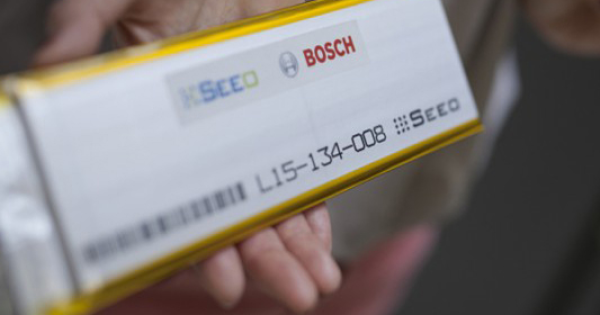The world's major car companies and accessories companies are striving to seek breakthroughs in the chemical composition and energy density of batteries. Recently, Bosch has announced that it plans to release a new solid-state electric vehicle and battery before 2020, which can double the mileage of electric vehicles and cut costs by half. Solid-state battery principle and advantages Traditional liquid lithium batteries have been vividly labeled as “rocking chair batteries†by scientists. Both ends of the rocking chair are positive and negative, and the liquid electrolyte is in the middle. Lithium ions run back and forth between the two ends of the rocking chair, from the positive electrode to the negative electrode. In the process of the positive electrode, the battery is charged and discharged. The principle of solid-state batteries is the same, but the electrolyte is solid. Solid-state electrolytes have a density and structure that allows more charged ions to collect at one end, conduct more current, and increase battery capacity. It is understood that the same amount of electricity, the solid-state battery will be smaller. Because the solid-state battery does not have a liquid electrolyte, storage will be easier. When used in a car, it does not require additional cooling devices and electronic controls, which effectively reduces the weight. Due to the good characteristics of solid-state batteries, it is currently the ideal battery for electric vehicles. The solid-state battery has another advantage. In the accident, the damage is not prone to explode or catch fire. The once famous Fiskers face bankruptcy due to their frequent battery fire incidents and other breakdowns. Solid-state battery development According to reports, Volkswagen has stated that it will make a decision on whether to use the new solid-state battery technology that is being developed by the US startup QuantumScape for public electric vehicles. If this solid-state battery technology is used, the EV's cruising range will reach 700 kilometers, exceeding Tesla and all existing new energy vehicles. It is not just Volkswagen. As early as 2010, Toyota had already launched solid-state batteries with a cruising range of more than 1,000 KM. According to its official, Sakti3 has produced a battery with an energy density of 1100 watt-hour/liter, which is almost twice as powerful as current lithium-ion batteries. Experts believe that if the battery power can be as much as Sakti3 proposed, then the cost of electric vehicle purchase and use may be the same as ordinary cars. Canada's Avestor has also tried to develop solid-state lithium batteries and eventually filed for bankruptcy in 2006. Avestor uses a high-molecular polymer separator to replace the liquid electrolyte in the battery, but it has not solved the safety problem. There have been several battery burning or explosion events in North America. Prior to this, Taiwan's Huineng Technology Co., Ltd. had introduced a solid-state battery using a flexible circuit board as its base material. Its thickness could reach an astonishing 2mm, equivalent to the thickness of a small piece of chewing gum, and it could be folded and bent freely, unfolded and leveled before proceeding. use. Such a seemingly inconspicuous battery, its capacity can reach 1000 milliamperes, and an iPhone-sized charging treasure, its capacity is also in about 5000 milliamperes. Solid-state battery future development Solid-state battery is one of the development directions of future electric vehicle battery technology, but it is not the only one. Fuel cells, super capacitors, and aluminum-air batteries all have a large space for development. Ultimately, it depends on the type of battery that can be commercialized. The cost achieves a perfect balance. It is understood that the current state of the lithium battery costs 200-300 US dollars / kWh, but if the current state of the art to produce enough for the electric vehicle battery power will cost up to 90 million US dollars. According to reports, an important reason for the high production cost of solid-state batteries is that battery production efficiency is low, but in the future battery costs will be reduced to 100 US dollars/kWh. Solid-state batteries are not a new concept, but they have not made much progress in years of research and development. Experts believe that even if they can ultimately reduce the cost of battery production, it takes a short time from the lab to mass production. Summary: One of the important issues that hinder the development of electric vehicles today is not the automotive products themselves, but the battery life. Lithium batteries are already mature power supplies, but their potential remains to be discovered. Electrolytes are the biggest bottleneck. Solid electrolytes may be the breakthrough of battery technology. Vacuum Belt Filter,Slurry Dewatering Vacuum Filter, Tailing Process Belt Filter, Leach Residue Belt Filter Quantum Conveying Systems Yangzhou Co.,Ltd. , https://www.yzconveying.com